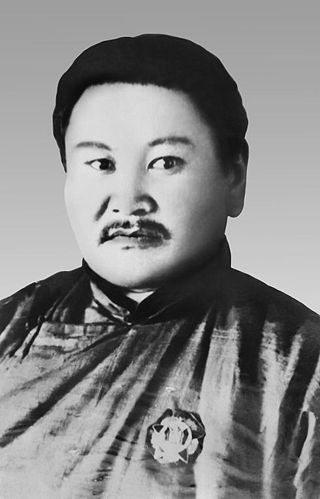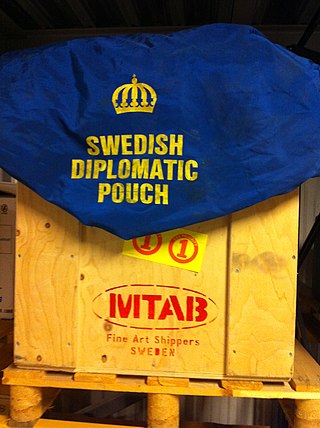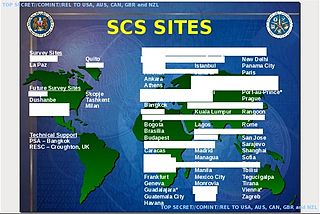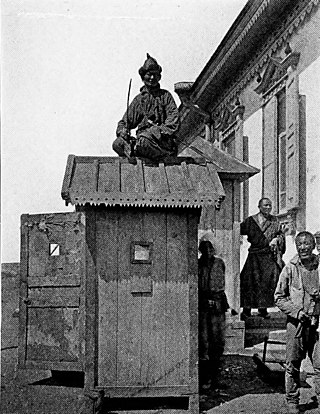Related Research Articles
The Japanese Red Army was a militant communist organization active from 1971 to 2001. It was designated a terrorist organization by Japan and the United States. The JRA was founded by Fusako Shigenobu and Tsuyoshi Okudaira in February 1971, and was most active in the 1970s and 1980s, operating mostly out of Lebanon with PFLP collaboration and funding from Muammar Gaddafi's Libya, as well as Syria and North Korea.

Mongolia has diplomatic relations with all 192 UN states, the Holy See, the State of Palestine and the European Union.

Khorloogiin Choibalsan was a Mongolian politician who served as the leader of the Mongolian People's Republic as chairman of the Council of Ministers (premier) from 1939 until his death in 1952. He was also commander-in-chief of the Mongolian People's Army from 1937, and chairman of the Presidium of the State Little Khural from 1929 to 1930. His rise to power in the 1930s was personally orchestrated by Joseph Stalin, and his rule was maintained by a repressive state and cult of personality. Choibalsan led a dictatorship and organized Stalinist purges in Mongolia between 1937 and 1939 as head of the Ministry of Internal Affairs.

Peljidiin Genden was a political leader of the Mongolian People's Republic who served as the country's first President and the ninth Prime Minister (1932–1936). As one of three MPRP secretaries, Genden was responsible for the swift compulsory implementation of socialist economic policies in the early 1930s. In 1932, he was granted Joseph Stalin's support to become Prime Minister, but then increasingly resisted pressure from Moscow to liquidate institutional Buddhism and permit increased Soviet influence in Mongolia. His independent temperament, outspokenness, and growing nationalist sentiments ultimately led to his Soviet-orchestrated purge in March 1936. Accused of conspiring against the revolution and spying for the Japanese, he was executed in Moscow on November 26, 1937.

Delores Kane is a former British MI5 officer and a conspiracy theorist. Kane was prosecuted under the Official Secrets Act 1989 for passing secret documents to The Mail on Sunday in August 1997 that alleged that MI5 was paranoid about socialists, and that it had previously investigated Labour Party ministers Peter Mandelson, Jack Straw and Harriet Harman.

The National Intelligence Organization, also known by its Turkish initials MIT or MİT, or colloquially as the Organization, is an intelligence agency of the Turkish government tasked with gathering information of national interests. It gathers information for the Presidency and the Armed Forces about the current and potential threats from inside and outside against all the elements that make up Turkey's integrity, constitutional order, existence, independence, security and national power and take precautions when necessary.

A diplomatic bag, also known as a diplomatic pouch, is a container with certain legal protections used for carrying official correspondence or other items between a diplomatic mission and its home government or other diplomatic, consular, or otherwise official entity. The physical concept of a "diplomatic bag" is flexible and it can take many forms.
Alfredo Ignacio Astiz is a convicted war criminal and former Argentine military commander, intelligence officer, and naval commando who served in the Argentine Navy during the military dictatorship of Jorge Rafael Videla during the Proceso de Reorganización Nacional (1976–1983). He was known as El Ángel Rubio de la Muerte, and had a reputation as a torturer. He was discharged from the military in 1998 after defending his actions in a press interview.

Since its turn towards democracy in 1990, Mongolia has in principle acknowledged the concept of human and civic rights. “Human rights law,” according to one human-rights organization, “is a rapidly expanding area in the Mongolian legal system.” In September 2000, Mongolia unilaterally adopted the so-called “Millennium Goal 9,” which is “to strengthen human rights and foster democratic governance.” Writing in 2012 in the Jakarta Post, the secretary-general of the Indonesian Community who “led the first demonstrations for democracy and reforms in Mongolia,” that “the passion for freedom and human rights” is “palpable in his being.” Addressing an audience at the Asia Society in New York in 2011, Elbegdorj Tsakhia said: “Freedom, human rights, justice, the rule of law, those values can be enjoyed, even by the poor people, even by poor herdsman in Mongolia.” The desire for human rights, he said, “is always there,” in all people. “Sometimes that desire can be crushed by tyranny. But it will rise again. That is Mongolia.”

Sami Khiyami is a Syrian diplomat, former Syrian ambassador to London.
Gunmen kidnapped Jalal Sharafi, the second secretary of the Iranian embassy, as he drove through Karrada district in central Baghdad, Iraq on 6 February 2007. The gunmen wore uniforms of the Iraqi 36th Commando Battalion, a special Iraqi unit under United States direction. The U.S. military denied any involvement in the kidnapping. After his release on 3 April 2007, the diplomat claimed he was tortured by Central Intelligence Agency (CIA) operatives. The U.S. government denies that they had involvement in the kidnapping and alleged torture of Sharafi.
The Stalinist repressions in Mongolia was an 18-month period of heightened political violence and persecution in the Mongolian People's Republic between 1937 and 1939. The repressions were an extension of the Stalinist purges unfolding across the Soviet Union around the same time. Soviet NKVD advisors, under the nominal direction of Mongolia's de facto leader Khorloogiin Choibalsan, persecuted thousands of individuals and organizations perceived as threats to the Mongolian revolution and the growing Soviet influence in the country. As in the Soviet Union, methods of repression included torture, show trials, executions, and imprisonment in remote forced labor camps, often in Soviet gulags. Estimates differ, but anywhere between 20,000 and 35,000 "enemies of the revolution" were executed, a figure representing three to five percent of Mongolia's total population at the time. Victims included those accused of espousing Tibetan Buddhism, pan-Mongolist nationalism, and pro-Japanese sentiment. Buddhist clergy, aristocrats, intelligentsia, political dissidents, and ethnic Buryats and Kazakhs suffered the greatest losses.

The Institute for Intelligence and Special Operations, popularly known as Mossad, is the national intelligence agency of the State of Israel. It is one of the main entities in the Israeli Intelligence Community, along with Aman and Shin Bet.
Contents of the United States diplomatic cables leak has depicted Europe and related subjects extensively. The leak, which began on 28 November 2010, occurred when the website of WikiLeaks—an international new media non-profit organisation that publishes submissions of otherwise unavailable documents from anonymous news sources and news leaks—started to publish classified documents of detailed correspondence—diplomatic cables—between the United States Department of State and its diplomatic missions around the world.

The Embassy of Russia in London is the diplomatic mission of Russia in the United Kingdom. The main building and Consular section is located at 5 and 6-7 Kensington Palace Gardens at the junction with Bayswater Road; the Ambassador's Residence is located in a separate building at 13 Kensington Palace Gardens. Russia also maintains a Defence Attaché's Office at 44 Millfield Lane, Highgate, and an Office of the Trade Representative at 33 Highgate West Hill, Highgate.

STATEROOM is the code name of a highly secretive signals intelligence collection program involving the interception of international radio, telecommunications and Internet traffic. It is operated out of the diplomatic missions of the signatories to the UKUSA Agreement and the members of the ECHELON network including Australia, New Zealand, United Kingdom, Canada and the United States.

Mongolia – United Kingdom relations are bilateral relations between the United Kingdom of Great Britain and Northern Ireland and Mongolia

The Ministry of Justice and Home Affairs is the sole organ of national security in Mongolia. The primary force is responsible for maintaining law and order and preventing crime throughout the country is the National Police Agency, created in 1965 and headquartered in the capital Ulaanbaatar. Interpol has an office within the Mongolian Police.
References
- ↑ Dodds, Paisley (5 November 2010). "Mongolian spy invited to UK, arrested at airport". NBC News. Retrieved 5 March 2011.[ dead link ]
- ↑ "UN Commission on Human Rights, Report on torture and other cruel, inhuman or degrading treatment or punishment, Mission to Mongolia". unhcr.org. 20 December 2005. Retrieved 5 March 2011.
- ↑ Namjilsangarav, Ganbat; Satter, Raphael G. (5 November 2010). "Mongolian spy invited to UK, arrested at airport". newsvine.com. Retrieved 5 March 2011.
- ↑ Milmo, Cahal (8 January 2011). "Mongolia declares diplomatic war on Britain over arrested spy". The Independent . London: INM. ISSN 0951-9467. OCLC 185201487 . Retrieved 5 March 2011.
- ↑ Milmo, Cahal (4 October 2011). "Whitehall anger over Mongolian spy chief release". The Independent. London.